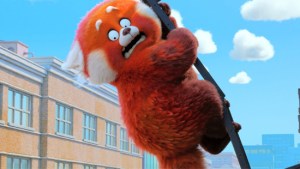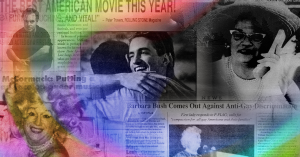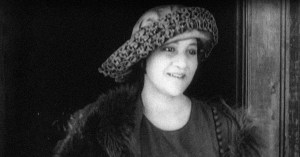21 SXSW Premieres We’ll Never Forget
From crowd-pleasing documentaries and pioneering comedies to midnight treats and cult favorites, the festival has debuted some of the best films in recent memory.

(Photo by Jonny Cournoyer/Paramount)
In 2019, Rotten Tomatoes turns 21, and to mark the occasion we’re celebrating with a series of features that look back at the brightest moments on screen of the past two decades – and one year – and the things that have us excited for the future.
Since its inception in 1987, South by Southwest (a.k.a. SXSW or just “South By”) has grown to become one of the most celebrated pop culture events in the world, with its unparalleled mix of music, film, and digital media. It’s one of the best places to scope out both established artists and rising talents, as well as all kinds of innovations in interactive entertainment.
In other words, it should be no surprise that some heavy hitters have graced the stages and screens in Austin, TX, and this is especially true of the film division. In the past 21 years, SXSW has served as the proving ground for up-and-coming filmmakers hoping to make a big splash, and it’s also played a big role in hyping up eventual cult classics and box office hits. With that in mind, and with SXSW 2019 kicking off this weekend, we decided to look back at some of the most memorable movie premieres that have happened at the festival during RT’s existence. Read on for a trip down memory lane at South By.
: A Documentary Hero Takes His First Steps
Director Morgan Neville didn’t even know that SXSW had a film festival component when he was looking to premiere his first documentary, a sometimes breezy and wistful look at an evolving Los Angeles through the lens of the people who shaped it. Variety’s review of the premiere decried the film’s listlessness and its “graceless and too abrupt” editing, the latter of which actually tapped into the associative, nonlinear style that would set Neville’s unorthodox documentarian work apart from the pack. Neville remembers the premiere as “low key” and intimate, surrounded by fellow “neophyte filmmakers” showing their wares. Shotgun Freeway was named runner up for Best Documentary Feature that year, and Neville would go on to win an Oscar (for 20 Feet from Stardom) and an Emmy (for Best of Enemies) and then break box office records with his film Won’t You Be My Neighbor?.
: Director Sean Baker Makes His Mark
Sean Baker’s first feature followed a group of white suburban young men in a slice-of-life tale, showing the blunt inner workings of the male psyche. It’s not surprising that the town that embraced Slacker fell in love with Baker and his objective, almost journalistic film work. As Baker told SXSW World: “I might not have kept going if it wasn’t for SXSW.” Reviews for the low-budget gem weren’t necessarily glowing, but they hit on Baker’s strength of presenting a character’s world with honesty, a trait he would carry on as he delved into the lives of disparate women in the San Fernando Valley (Starlet), Chinese immigrants in New York (Take Out), a trans sex worker in L.A. (Tangerine), and single moms in Kissimmee (The Florida Project).

(Photo by Thinkfilm courtesy Everett Collection)
: A Documentary D-E-L-I-G-H-T (And Awards Contender)
Director Jeffrey Blitz wasn’t even present for the first SXSW screening of his spelling bee documentary. Nervous, he’d taken a flight out from a commercial job and arrived outside the theater just as it was letting out. He told SXSW World: “I heard [people] raving about this spelling bee documentary they had just seen,” and thought it was a prank. Blitz’s first feature, Spellbound won the Documentary Feature Jury Award and became the festival’s first breakout hit, winning an Emmy and getting nominated for an Academy Award.
: GDT Earns Thunderous Applause, Cements SXSW’s Midnight Cred
Guillermo del Toro had already directed cult classics Cronos, The Devil’s Backbone, and Blade II before he took aim at the film adaptation of Mike Mignola’s Hellboy comic. The unofficial midnight world premiere of the film brought del Toro, Mignola, and star Ron Perlman to Austin, and the ending credits were met with what the Austin Chronicle called “thunderous cheers.” The film became a box office success, grossing nearly $100 million and spawning a sequel, but it also sealed SXSW as a midnights-friendly destination.
: Enter the Duplass Bros.
It’s difficult to overstate the impact the Duplass brothers had on both filmmaking and the film culture of SXSW. The Puffy Chair would mark their first feature, but the pair had already premiered a few of their shorts at the fest, creating a kind of community with like-minded filmmakers like Joe Swanberg and Andrew Bujalski, who premiered Kissing on the Mouth and Mutual Appreciation, respectively, alongside The Puffy Chair. From this year forward, SXSW was known as the place for Mumblecore, and the Duplass brothers would go on to bring their style to the mainstream.
: Open Mic Night With A Generation’s Defining Comics
Film festivals haven’t always been receptive to comedy, especially if the film is a documentary about lesser-known comics popular only on the alt-comedy circuits. But director Michael Blieden found a home for his debut documentary feature with SXSW and brought Patton Oswalt, Zach Galifianakis, Maria Bamford, and Brian Posehn to the masses of Austin with a premiere that included live stand-up sets by the film’s subjects. The Austin Chronicle called the film “incisively bawdy,” and the well-received live performance set the stage for the massive influx of comedy acts that would flock to the festival every year. Oswalt, Galifianakis, Bamford, and Posehn became some of the defining comics of their generation.

(Photo by Universal Pictures courtesy Everett Collection)
: Apatow Finds His Testing Ground
Judd Apatow raked in the praise for his directorial debut, The 40-Year-Old Virgin, but the idea of a comedy with a runtime more than two hours long was still a novelty when his follow-up Knocked Up tested the waters in Austin at a sneak preview. Variety called it “uproarious,” and attendees noted the laughter was so loud in the theater that a good number of the punchlines couldn’t even be heard. Viewers of that preview wondered whether Paramount would cut the film down to under 90 minutes — nope! SXSW became Apatow’s proving ground that longer, more thoughtful comedy could play to wide audiences.
: Greta Gerwig Makes Her Directing Debut
With a budget of $15,000, Mumblecore comedy Nights and Weekends brought Joe Swanberg back to SXSW, but this time with a relatively unknown co-director/co-writer/co-star — Greta Gerwig. Swanberg and Gerwig had collaborated before on 2007’s Hannah Takes the Stairs, but this film would mark Gerwig’s directorial debut. Noel Murray at the AV Club said, “Swanberg and Gerwig also have a gift for constructing the kind of moments rarely seen in contemporary American independent film.” Gerwig had always intended to become a playwright, and though it would be another nine years before she would direct again (Lady Bird), that effort would earn her Oscar nominations for Best Original Screenplay and Best Director.
: Barry Jenkins, Before Moonlight
SXSW was no stranger to the type of romantic verité filmmaking Austinite Richard Linklater revived from the Left Bank French New Wave with Before Sunrise. But Barry Jenkins’ Medicine for Melancholy pried the genre from white hands and showed two African American characters talking from dawn ’til dusk about art, culture, and love. The film starred the unknown Wyatt Cenac and Tracey Heggins, but the buzz out of SXSW was enough to propel Medicine to multiple Indie Spirit Awards nominations, inspiring a generation of black filmmakers, including Justin Simien, Lena Waithe, Ava DuVernay, and Terence Nance.
: Lena Dunham Follows Up on the Promise
Lena Dunham’s hour-long feature debut Creative Nonfiction showed so much promise at 2008’s SXSW that when she returned in 2010 with a proper full-length feature, Tiny Furniture, critics were already hip to the wünderkind’s comic sensibilities. The film took the top narrative feature prize, with Dunham accepting a breakout award for women directors, leading IFC Films to acquire and distribute Tiny Furniture. Dunham’s relationship with SXSW continues, and the fest has become a destination for young female auteurs, including Julia Hart, Stella Meghie, and Nijla Mu’min.

(Photo by Liam Daniel/Screen Gems courtesy Everett Collection)
: Joe Cornish Earns Peter Jackson Comparisons
By the time Joe Cornish premiered his feature debut, Attack the Block, SXSW programming had already become known for its Midnights section. Fans of director Edgar Wright knew the Shaun of the Dead helmer had executive produced for Cornish and packed the theater in anticipation of a Wright-anointed genre film, but the general reception was that Attack was so much better than they could even hope for. Writing for Cinemablend, Matt Patches called the film a throwback to early Peter Jackson and said audiences emitted an “audible, pleasantly shocked yelp” throughout the gory action sequences.
: An Oscar Winner Starts Its Journey
Dan Lindsay and TJ Martin knew they were “no-name directors” when they applied to SXSW with their documentary debut about a struggling Memphis football team. The Austin Chronicle said, “Undefeated isn’t just a great sports doc, it’s a great documentary. Period.” The directors credit the festival with helping the film sell for a seven-figure deal after an all-night auction, get distribution, and earn widespread acclaim, leading to their winning the Academy Award for Best Documentary. “That definitely changed our lives, and it all started at SXSW,” Lindsay and Martin told SXSW World.
: A Work in Progress Works Wonders
Paul Feig had already made a name for himself acting in and directing numerous comedies, but when he brought his work-in-progress Bridesmaids to SXSW for a midnight premiere, he says not a single person in the audience knew anything about the film. On top of that, Kristen Wiig and Maya Rudolph weren’t completely known outside of their individual runs on SNL. But Feig said to SXSW World that when the audience burst into laughter that “it was possibly the greatest night of my career.” Bridesmaids introduced audiences to superstar Melissa McCarthy and raked in a whopping $288 million at the box office.
: A24 Makes a Big Play
At the SXSW world premiere of Harmony Korine’s teen day-glo crime thriller, only a few audience members squeamish from the provocateur’s film walked out, but those who stayed raucously applauded such an audacious movie. At the same time, fledgling distribution company A24 was trying to make a name for itself and saw the perfect opportunity in Korine. They purchased the film right out of the festival, marking themselves as a company to take a chance on artists and weirdos and bolstering SXSW as a destination for film acquisitions.

(Photo by Cinedigm courtesy Everett Collection)
: The Stars of Tomorrow in a Move That Sets the New Standard
Director Destin Daniel Cretton specifically aimed to finish his feature about a young staff worker in a residential treatment facility for the SXSW deadlines. Producer Asher Goldstein said it felt like the perfect “cultural fit” for this story about simple people trying to live their lives, starring a cast of complete then-unknowns, including Brie Larson, Stephanie Beatriz, Rami Malek, and Lakeith Stanfield. Before the film even premiered at SXSW, sales negotiations began, signaling Short Term 12 was something special. It won both the Grand Jury and Audience Award for Narrative Feature, and prompted The Atlantic in 2014 to ask “Who’s This Year’s Short Term 12?” at SXSW.
: Karyn Kusama’s Thrilling Comeback
Director Karyn Kusama stripped her style down to its indie roots for her horror-thriller The Invitation. She’d faced an uphill battle with high-budget flops, like Aeon Flux and Jennifer’s Body, but burst back on the scene and out of director jail with a psychological stunner she filmed on a bare budget in a single location. Midnighter attendees of the premiere immediately buzzed about the film, with Justin Chang, writing for Variety, calling it a “perfectly pitched exercise in psychological dread.” The Invitation hit many best-of lists when it premiered theatrically, but Kusama credits SXSW with the relaunch of her career. “SXSW means discovery, it means surprise, and it means a jolt of energy, which was there in abundance for us,” she told SXSW World.
: Why You Stay for the Q&A
Trey Edward Shults’ short film Krisha won big at SXSW 2014. When he stretched that drama — about a woman who reconnects with her family over a disastrous Thanksgiving weekend — into a feature, Shults naturally wanted it to premiere at SXSW as well. For the Q&A portion, Shults brought his stars, his real-life aunt Krisha Fairchild and mother Robyn Fairchild, for an intimate talk about family and filmmaking. “I’ve been a professional actor my whole life, but I had no ambition,” Krisha said, before crediting her nephew for sparking a creative flame in her. The film won the Grand Jury Prize for Narrative Filmmaking, and the audience went wild when Shults’ entire cast/family stormed the stage.
: A Tense, Moving Hometown Achievement
Keith Maitland is an Austin director whose films revolve around the people, places, and major events of Texas. His documentary Tower was based on a Texas Monthly story from Pamela Colloff, which walked people through the terrifying 96-minute ordeal of Charles Whitman climbing the UT Austin tower and opening fire on a campus of innocent people. The SXSW premiere was an emotional affair, with Eric Kohn of IndieWire saying that Tower “imbues the catastrophe with renewed urgency.” The film won both the Grand Jury Prize and Audience Award for Documentary Feature, and Maitland told SXSW World that “sharing this deeply emotional story here, where it happened, was one of the most cathartic cinematic experiences I’ve ever witnessed.”

(Photo by Steve Dietl/Warner Bros.)
: Key and Peele Meet Expectations
Before there was Get Out, there was Peter Atencio’s crime comedy Keanu, co-written by Alex Rubens and Jordan Peele in his feature-writing debut. Some fans of the stars’ Comedy Central show Key & Peele waited in line for three hours for the midnight premiere, and Peele and Keegan-Michael Key began throwing out stuffed cats to an audience dreading a time change and an hour lost the next morning. The reception to the film was only warm, but it was enough to propel Peele into writing his next feature, which would earn him an Academy Award for Best Original Screenplay.
: An Ending for the Ages
Ana Asencio’s gritty, spare, 80-minute thriller marked a wicked debut for the writer-director-producer-star, who’d spent a decade perfecting the script. And SXSW proved a perfect match for a 16 mm film about an immigrant woman caught in the most tragic day of her life. At the premiere, audiences gasped, shook by tension and an unnerving ending. Peter Goldwyn of Samuel Goldwyn Films snapped up the rights and said, “Most Beautiful Island is a memorable film, which captured hearts, minds, and the Grand Jury Prize at SXSW,” and although Asencio hasn’t released a follow-up yet, that ending she wrote earned a place on Vulture’s “100 Scares That Shaped Horror.”
: Silence on Screen, Screams in the Theater as Box Office Monster Is Born
John Krasinski’s horror debut earned what Variety writer Ramin Setoodeh called “enough shrieks inside the theater to please [the] director” at the film’s SXSW premiere. As Setoodeh pointed out, SXSW had become a proving ground for out-of-the-box studio releases, and the fanfare inside the theater that night signaled to Paramount Pictures they’d have a hit on their hands. Eric Kohn of IndieWire wrote that “the movie maintains a minimalist dread throughout, with every footstep or sudden move carrying the potential for instant death.” A Quiet Place went on to earn $340 million at the box office, making SXSW a reliable litmus test yet again.











